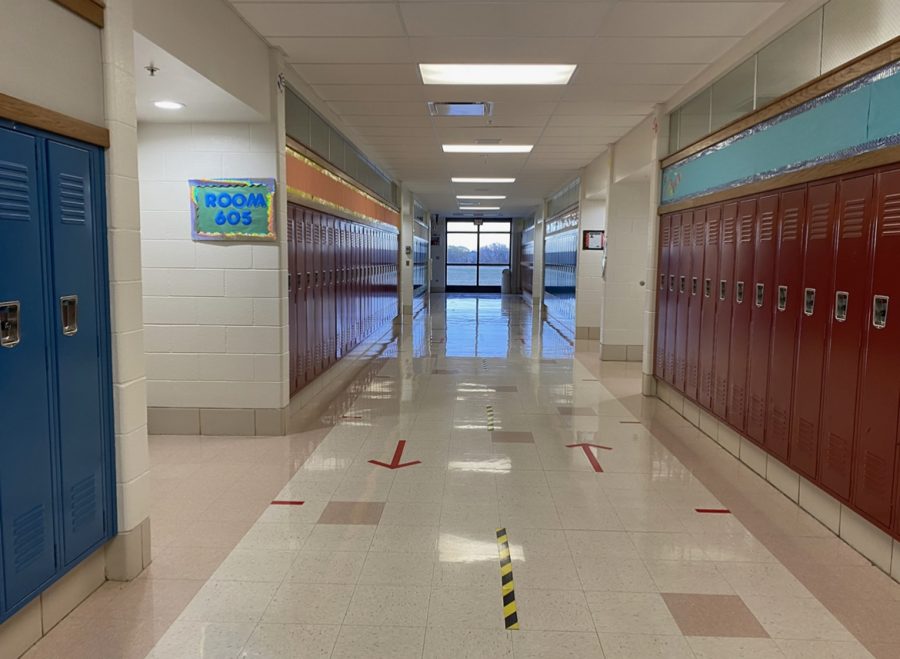Labelling Students: Beneficial or Harmful?
With the usage of “tracking” in middle schools and high schools, debates have ensued over what the effects are of categorizing students. This is what some LZ students and educators have to say on this topic:
Photo by and used with permission of Alyssa Karstenson
Here is the hallway known as the “gifted” hallway at MSS. Here many students were given labels that caused them to view themselves in certain ways.
Schools are a breeding ground for categorization- gifted, remedial, special needs, overachievers, troublemakers, etc. The opportunities for labelling students have only increased since the introduction of tracking which, according to the www.nassp.org, was in the 1930s. It begs the question: should students be subjected to categorization?
Although the tracking system has been here for around 90 years, controversy has surrounded it in recent years with people wondering whether the positives or negatives outweigh the other. With most students at LZHS being separated between three tiers (college preparatory, honors, and AP), this debate finds its way here at LZHS.
One positive aspect to the structured level of classes is how kids are sorted into different groups and classes. It can provide challenging coursework to the students who need it, but also gives people who aren’t ready for rigorous courses their own option.
“People are good at different things […] like I might be really good at math but not very good at English and so I choose to take honors math but CP English,” Eva Krastev, freshman, said.
If the school were to take away the different levels each subject has at LZHS, it could be possible that there would be students whose needs wouldn’t be met. People such as middle school teacher, Simone Galati, who teaches students in Middle School South’s gifted program, believes some students wouldn’t be pushed or challenged to use their mind and strengthen it, defeating the very purpose of school, without having higher levels of coursework.
“Just as students who have special education needs and are struggling have a right to an individualized education plan, students who are achieving above the norm deserve an alternative education environment,” says Galati.
According to Galati, having different levels of learning not only makes it easier for students to push themselves, and find what they need, but dividing the classes up also allows teachers to provide a good learning experience to the student.
“You could, in theory, teach everybody together […] some kids would get like a support material so we’ve got the kids at the low end who need additional support, and then the kids at the high end who get enrichment […] it’s hard to teach everybody and remediate some and reach others simultaneously,” Ian Silverman, English teacher, said.
Although there are benefits that can be seen from how the school system has been organized, there can also be a negative side to it: students can end up internalizing the label forced upon them. This behavior was seen in students who were enrolled in “academic” classes at LZHS, classes that were one level below CP.
“[…] their whole day was spent at this low level, so they started to see themselves as just an ‘academic’ kid,” Silverman says.
This observation of a lowered self-esteem isn’t something seen in LZHS students only, it is an occurrence that has been studied within the fields of psychology and sociology. It has even been named and is known as the “looking glass self” theory and was created in 1902. It describes the act of individuals basing their “sense of self” on how they believe others view them, which is what Silverman saw in his students.
LZHS ended up abandoning the Academic level after a couple of concerns. One was that there were “a number of universities that would not accept a remedial level class towards an admission requirement,” Silverman said. The second reason was that the NCAA Clearinghouse would not accept any academic level credits, preventing these kids from playing sports in college.
There are also negative consequences to labelling students on the other side of the spectrum. Galati says she has seen some students put loads of pressure on themselves to live up to the “gifted” label. As a former gifted student, Krastev says she saw herself doing this during her time in middle school, and that this problem came with her to high school as an honors and AP student.
“The term ‘gifted’ implies that you were born superduper smart, and that you knew everything right away. That was not really my case. It made me think that the rest of the class was a lot smarter and knew the material a lot easier than me which put a lot of pressure on me. It made me think that I had to prove that I fit into that class,” Krastev said.
However, despite problems with labelling students being identified by people like Silverman and Krastev, they still believe the solution to it is hard to find. Silverman suggests being mindful of the language the education system uses to label students, but Krastev says that being conscious of the labels that are used can only go so far.
“[P]eople are always gonna just see themselves as lower or higher than the other people no matter what you call the program. It’s not even just the word, it’s the stigma behind it and the way people perceive it. Oh, but this also doesn’t mean we shouldn’t focus on harm reduction. That’s still really important,” Krastev said.
Although Krastev and Silverman believe that it would be incredibly hard to create an effective education system without tracking, they do believe that people should try to reduce the harm of labels as much as they can. They believe society can work together and use labels as a means to encourage students rather than hurt and dishearten them.

Coming back for her last year on Bear Facts, Gurneer will be Spotlight Editor for the second year in a row. Outside of Bear Facts, she participates in...


